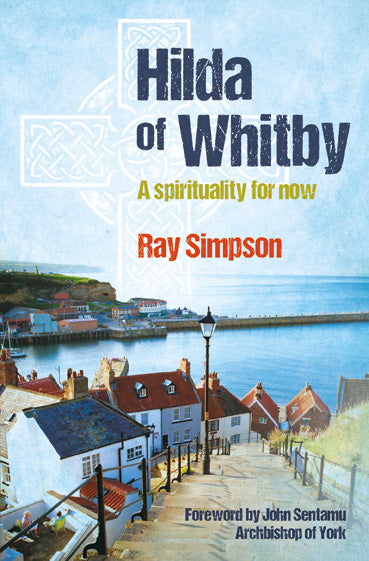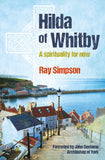Hilda of Whitby: A spirituality for now
In the dark and turbulent centuries after the Roman occupation of Britain and during the Anglo-Saxon colonisation, the light of heaven still shone through the work and witness of the monastic communities, ‘villages of God’, which dotted the land. One of the most remarkable figures of those times was Hilda of Whitby. Born and reared among warring pagan tribes, through the influence of Celtic saints and scholars she became a dominant figure in the development of the British Church, above all at the famous Synod where Celtic and Roman Churches came together. This book not only explores the drama of Hilda’s life and ministry but shows what spiritual lessons we can draw for Christian life and leadership today.
In the dark and turbulent centuries after the Roman occupation of Britain and during the Anglo-Saxon colonisation, the light of heaven still shone through the work and witness of the monastic communities, ‘villages of God’, which dotted the land. One of the most remarkable figures of those times was Hilda of Whitby. Born and reared among warring pagan tribes, through the influence of Celtic saints and scholars she became a dominant figure in the development of the British Church, above all at the famous Synod where Celtic and Roman Churches came together. This book not only explores the drama of Hilda’s life and ministry but shows what spiritual lessons we can draw for Christian life and leadership today.
Published to coincide with the 1400th anniversary of the birth of Hilda.
Foreword by the Archbishop of York
We have much to be thankful for in God's own county, but of all the bright stars of Yorkshire's rich heritage of Christian witness, for me St Hilda of Whitby shines out as one of the brightest. I am thankful to Ray Simpson for retelling her story in a way that connects so directly with our contemporary world, inspiring prayer and reflection which I trust will bear fruit as it did so abundantly, graciously, and quietly in her own life.
I enjoy my visits to Whitby, not just for the fantastic kippers I often come away with, but also because Hilda's memory lives on in the faith, hope, and love of today's Christian community in that town. I thank God also that the Sisters of the Order of the Holy Paraclete continue the monastic tradition in that town, with their Mother House, St Hilda's Priory, Sneaton Castle, looking across the bay to the ruins of the Abbey where Hilda's church once stood.
Hilda's example of self-sacrificial leadership, and of courageous acceptance of what the gathered church discerned as the will of God, is a particular challenge to us today. At the Synod of Whitby over which she presided, although she was a firm believer in the Celtic way, she accepted fundamental changes to the time-honoured ecclesiastical polity of the Celtic Church. She was willing to embrace the new ways of the Roman mission for the sake of the unity of the Church's witness in this land.
Hilda was baptised on Easter Day, April 12th 627 on the site where York Minster stands today, along with King Edwin, by Paulinus, first Bishop of York. In recent years I have baptised new believers on the same spot outside the Minster, along with other local church leaders. I visited Hinderwell a few months after becoming Archbishop of York. I baptised a baby at Hilda's well and drank water from the well too!
My prayer is that those baptised today, and all of us who seek to follow Jesus in the North of England, will follow Hilda's example. With her I hope we shall live wholeheartedly for Jesus, carrying the light of God into the communities to which we belong, and seeing the love of God transform both church and nation.
This book will help us along the way.
+Sentamu Eboracencis
Introduction
Born into a pagan, Anglo Saxon family in the province of Deira (land to the north of the Humber) in 614, Hilda's early life was to witness much of the brutality and darkness for which that period has become most famous. Her own father was poisoned in the continuing battle for power between ruling claimants.
Her first encounter with Christianity happened after her uncle Edwin won power, encountering a vision of Christ which led to the family's baptism. But victory was short term and Hilda was forced into exile in the Christian kingdom of the East Angles, holding on to her newfound faith while others cast it aside.
Hilda returned north after power passed to the Christian ruler Oswald who set out to reconvert the people of the area, inviting Aidan of Ireland to lead the work. Hilda had only known Christianity with Roman roots. She now came into direct contact with Celtic Christianity for the first time and discovered a stark difference in terms of lifestyle, approaches to mission, models of church and the requirements of soul friends to assist personal faith development.
Hilda planned to become a nun and depart overseas, but Aidan convinced Hilda to stay and set her on the path of her life's work of pioneering monasteries and establishing learning for men and women. The Celtic church had no qualms over women leadership, unlike the Roman church.
Having set the scene, Ray Simpson goes on to unfold the story of Hilda's work at Hartlepool and Whitby, drawing out key lessons for our own age from her life, work and legacy and through questions for reflection, encourages personal application.
Just before her birth, Hilda's mother had a vision of light cast across Britain from a necklace - a vision that St Bede, writing in his Ecclesiastical History of the English People (completed 731AD), regarded as being fulfilled through Hilda, and a light Ray Simpson now projects into our own age. Published to coincide with the 1400th anniversary of the birth of Hilda.
This enthusiastic and well-informed book is the work of an author who knows his topic well from within, and is delighted by it.
He first tells the story of Christianity in Britain - especially northern Britain - in the days when the Romans had just left and the early Anglo-Saxon Christians were beginning to form a new kind of society. So the word 'spirituality' heads the first three chapters and deals in turn with factors that did, over those early centuries, form just that. We read that it was uphill work, but work that paid off - and out of which we are still, today, reaping benefit.
Of the people who played an important part in establishing Christianity in north Britain, some names live on. In this book, Simpson is most interested in St Hilda, who, as he makes clear, was responsible for much of the dedicated and enthusiastic work that rooted Christianity. For her, the gospel was the beginning, middle, and end of things.
(There were, of course, many other saints. Aidan's is the other name that crops up frequently, and he, Simpson says, profoundly impressed Hilda. Those two names are today linked in the name of the Community of Aidan and Hilda, a community that Simpson founded, and which is centred on the Holy Island of Lindisfarne.)
'Wholeness is the realisation of our humanity,' Simpson writes as he describes spiritual formation at Whitby 14 centuries ago. In his recounting of his own experience, one senses that the claim may well be authenticated.
The story told in this book is, indeed, a powerful one. Reading it may well bring to the attention of more people the value (to both Church and society) of religious communities. Currently, many of these are getting smaller and smaller. I sense, however, that here is an authentic reaching out of the past to find a way of living the Christian life, both in everyday society and in a dedicated community. Such a relationship is one that may well 'bear fruit, fruit that shall last'.
John Armson
Canon Armson is a former Precentor of Rochester Cathedral







